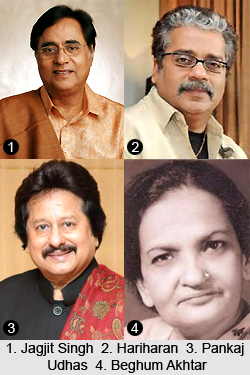 Ghazal, the music genre that is a poetic form comprises couplets, which shares rhyme and abstain. The word ghazal etymologically means "the mortal cry of a gazelle". Love, separation and loneliness are the expressions that are expressed with a hypnotic meaning, through ghazals. In ghazal, therefore these are the common themes. However, `unrequited love` has been considered as the most substantial theme of ghazal. It can thus be realized as `a poetic expression of both the pain of loss or separation and the beauty of love in spite of that pain`. This genre of music has been considered as the ancient form that germinated from 10th century Persian verse. The form originally developed from the Persian qasida.
Ghazal, the music genre that is a poetic form comprises couplets, which shares rhyme and abstain. The word ghazal etymologically means "the mortal cry of a gazelle". Love, separation and loneliness are the expressions that are expressed with a hypnotic meaning, through ghazals. In ghazal, therefore these are the common themes. However, `unrequited love` has been considered as the most substantial theme of ghazal. It can thus be realized as `a poetic expression of both the pain of loss or separation and the beauty of love in spite of that pain`. This genre of music has been considered as the ancient form that germinated from 10th century Persian verse. The form originally developed from the Persian qasida.

About Gazals
Ghazal has been considered as one of the common, favourite and non-classical form of music mainly popular amongst the Indian people. During the 12th century with the encroachment of the Muslims, this genre of music came into vogue. From 12th to the 18th centuries was the period of establishment of Indian ghazal. The curious factor about ghazal is that it was initiated in the north but received its Urdu characteristics down south. At that time Nusrati, Wajhi, Hashmi, Mohammad Quli Qutab Shah and Wali Dakhini were the significant rulers with whose patronage the music form ghazal had built its foundation. The musical form thus took place within the 18th and 19th centuries.

Popular Indian voices
Ghazal in its previous, prevalent form mainly was written by the Persian mystics and singers Jalal al-Din Muhammad Rumi (13th century) and Hafez (14th century), the Turkish poet Fuzuli (16th century), as well as Mirza Ghalib (1797-1869) and Muhammad Iqbal (1877-1938), who both wrote Ghazals in Persian and Urdu. Poets writing in Urdu verses are- Wali, Siraj, Mir Taqi Mir, Mirza Ghalib, Zauq, Dard, Momin, Daagh, Iqbal, Jigar Moradabadi, and Post-partition poets including Firaq Gorakhpuri, Majrooh Sultanpuri,Faiz Ahmed Faiz, Sharyaar, Nasir Kazmi, Parveen Shakir, Qamar Jalalabadi, Qaisar ul Jafri, Ahmed Faraz, Abdul Ahad Saaz, Josh Maleehabadi, Akbar Ilahabadi, Makhdoom Mohiuddin, Asghar Gondvi Shakeel Badauni, Sahir Ludhiyanavi, Nida Fazli, Obaid Azam Azmi and Munawwar Rana.These are some of the Indian Ghazal Singers whose verses are being performed now-a-days.

India has produced many surpassing talents Ghazal Singers:
Anup Jalota - Anup Jalota can be weighed as the numero uno maestro in the ghazal domain.
 Talat Aziz - This ghazal singer has been gifted with a `mellifluous and soft voice` admired strongly amongst the other revered.
Talat Aziz - This ghazal singer has been gifted with a `mellifluous and soft voice` admired strongly amongst the other revered.
Hariharan -- Hariharan successfully juggles playback singing in Hindi, Tamil, Malayalam, & Telugu movies, simultaneously establishing himself as a ghazal singer.

Pankaj Udhas --- The unequalled quality of Pankaj Udhas is that he has developed a singing style involving Urdu verses of poets set in the musical tunes.
Chitra Singh --- Wife to Jagjit Singh, Chitra Singh holds her ground in Urdu and Hindi ghazals, despite being surrounded by other maestros.

Jagjit Singh --- Crowned the `Ghazal King`, Jagjit Singh needs no introduction to describe him.
 Jasvinder Singh -- Jasvinder Singh possesses a `soft and silky voice` with which he has proved his courageousness as a performing artist.
Jasvinder Singh -- Jasvinder Singh possesses a `soft and silky voice` with which he has proved his courageousness as a performing artist.
Beghum Akhtar -Looked up in present times as `the queen of ghazals`, Beghum Akhtar personifies the concept of `ghazal gaayaki`.




















